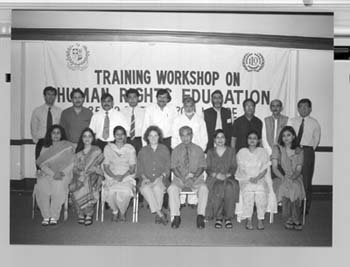- TOP
- 資料館
- FOCUS
- September 2000 - Volume 21
- National Seminar on Human Rights Education - Pakistan
FOCUS September 2000 Volume 21
National Seminar on Human Rights Education - Pakistan
Background
Pakistan's Ministry of Law, Justice and Human Rights (Human Rights Wing) and the International Training Centre of the ILO (Turin, Italy), in cooperation with the ILO Office in Islamabad, held on September 25-29, 2000 in Lahore a seminar on human rights education.

This seminar is part of the "Promotion and Implementation of Human Rights - An Institutional Capacity Building Project." The Norwegian Agency for Development Cooperation funds this project while ILO implements it. The project involves various Pakistani government offices and institutions, NGOs, and employers' and workers' organizations. The long-term goal is to create awareness in Pakistan about human rights concepts and issues. The immediate objective is to enable project participants to improve their role in the protection and promotion of human rights.
The activities under the project are therefore meant to increase their knowledge of the human rights mechanisms operating at the global level and also to strengthen their capacities at the national and local levels.
The Lahore seminar is the fourth in the series of seminars under the project.
Objectives
The principal objective of the Lahore seminar is to enable participating organizations to stimulate and support national and local initiatives in the field of human rights education and awareness-raising. The seminar also aims at providing participants with new training tools and ideas on methodologies to disseminate the human rights message through educational activities.
Participants
The participants came from various Pakistani government agencies and training institutions (National Institute of Public Administration, Civil Services Academy, Ministry of Education-Curriculum Wing, Ministry of Labour - Directorate of Workers Education, Ministry of Law, Justice and Human Rights - Mass Education Project). There were also representatives of non-governmental organizations (Pakistan Institute of Medical Sciences, Pakistan Education Society, Sindh Graduates Association, ASR), and media groups (The News, Daily Nawai Waqt, Serendip Production). There were observers from one more government training institution (Pakistan Administrative Staff College - Lahore), one NGO (Citizen Commission for Human Development) and one school (Grammar School Rawalpindi).
Course Content
Participants discussed human rights principles and the UN human rights system, the formal and non-formal education systems and the integration of the subject on human rights standards into existing training programs, and the role of the media in creating human rights awareness. Presentations were made on several topics including international human rights standards, experiences on human rights education in the Asia-Pacific, and the United Nations Decade for Human Rights Education.
The participants developed plans of action on research and/or human rights education activities at the end of the seminar. These plans can be adopted as part of the programs of their respective organizations. A few of the drafted plans will be selected by ILO for funding support for a six-month period ending in October 2001.
Observations
The participants from both government and non-governmental organizations appreciate having a better understanding of human rights, and human rights education activities at the local, regional and international levels. They are interested in introducing human rights education as a component of the existing training programs in their own organizations.
The participation of representatives of government training institutions is significant. This is probably the first time that these institutions are considering human rights as a subject in their training courses. This can lead to the introduction of regular human rights courses for government personnel in the in-service training programs. A regular human rights course can help develop systems supportive of human rights within the government machinery of Pakistan.
It is important to support the development of these human rights courses. Such support can come from within and outside Pakistan.
This series of seminars is being held at a time when the Pakistani government is showing interest in human rights education and human rights mechanism. A government-sponsored national convention on human rights was held for the first time in Pakistan earlier this year, and a commission on women has been established. These are positive developments. Considering the many human rights issues in the country (as in many other countries), these developments deserve to be followed-up with concrete steps such as ratification of many more human rights instruments, amendment and/or enactment of laws and development of programs in line with the ratified instruments. Ultimately, there is no other way than to continuously support the spread of human rights consciousness in the Pakistani society to assure that government-supported programs on human rights will be used judiciously.
